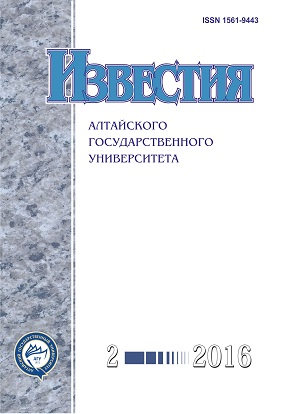Paradigms in the Minds of the Workers of Western Siberia in the Late 19th — Early 20th Century
Abstract
Today more and more works are devoted to the sociocultural study of various social strata of the Russian society, including the working class. This article is the results of research on an aspect of socio-cultural appearance of workers in Western Siberia. Its essence lies in the negative perception of reality, including the one on the ontological level. It found expression in daily life and production practice. On the basis of source materials and research of literature, the article draws conclusions about the presence in the minds of the workers of negativism, fatalism and feelings of hopelessness which resulted in untidy living conditions, alcoholism, deviant behavior, hostility towards the state and their direct management (along with the belief in a “good tzar” and the remnants of the patriarchal structure), high ontological status of “alchohol providers” who broke the bonds of “mortal” world. The vast majority of Siberian workers were illiterate, unskilled or semi-skilled, significant proportion of the workers had only recently left the village preserving some connections with it. Of course, in this strata the traditional paradigm of mind must have been dominant which, in our opinion, was confirmed by subsequent events in Russian history.
DOI 10.14258/izvasu(2016)2-28
Downloads
Metrics
References
Сайнаков Н.А. Маргинальность как понятие. Методологические перспективы в историческом исследовании // Вестник Томск. гос. ун-та. - 2013. - № 375.
Автобиография Култышова Н.К. // Центр документации новейшей истории Томской области. - Ф. 76. - Оп. 2. - Д. 197.
Голикова К.А. Автобиография // Томские женщины. XX век : сборник документов и материалов. - Томск, 2003.
Алтайский Б. В царстве черняди // Сибирские вопросы. - 1906. - № 6.
Плотников А.Е. О социальном облике сибирских рабочих пореформенного периода // Экономические и социальные проблемы истории Сибири : мат. науч. конф., посвящ. 400-летию присоединения Сибири к России. - Томск, 1984.
Вишневский А.Г. Серп и рубль: консервативная модернизация в СССР. - М., 1998.
Миронов Б.Н. Социальная история России периода империи (XVIII - начало XX в.): генезис личности, демократической семьи, гражданского общества и правового государства. - СПб., 2003. - T. 1.
Яковенко И.Г., Музыкантский А.И. Манихейство и гностицизм: культурные коды русской цивилизации. - М., 2011.
Яковенко И.Г. Россия и репрессия: репрессивная компонента отечественной культуры. - М., 2011.
Зиновьев В.П. Индустриальные кадры старой Сибири. - Томск, 2007.
Шамина Л., Башунов В. Школа Диониса. История Барнаульского ликеро-водочного завода за сто лет, воссозданная по официальным документам, архивным источникам, в цифрах, событиях, фактах, с привлечением живых описаний, воспоминаний и свидетельств тех, кто связал с заводом свою судьбу. 1899-1999. - Барнаул, 1999.
Зиновьев В.П. Жилищно-бытовое положение семей горнорабочих Сибири в конце XIX - начале XX в. // Рабочая семья Сибири. - Барнаул, 2012.
Семевский В.И. Рабочие на сибирских золотых промыслах. Историческое исследование. - Т. 2. Положение рабочих после 1870 г. - СПб., 1898.
По Тавде // Сибирский листок. - 1900. - 27 февр.
Новониколаевск. Сиботдел управления чрезвычайной комиссии. Москва. Замнарком В.Д. // ЦДНИ ТО. - Ф. 1. - Оп. 1. - Д. 55. - Л. 224.
Зверев В.А. Дети - отцам замена. Воспроизводство сельского населения Сибири во второй половине XIX - начале XX вв. - Новосибирск, 1993.
Зверев В.А. Региональные условия воспроизводства крестьянских поколений в Сибири (1861-1917 гг.). - Новосибирск, 1998.
Головачев П. Сибирь. Природа. Люди. Жизнь. - М., 1905.
Рапорт управляющего Кольчугинской копи 22 января 1893 г. // Государственный архив Алтайского края. - Ф. 3. - Оп. 1. - Д. 127.
По вопросу об упорядочивании питейного дела на золотых приисках В.С. (1901-1904 г.) // РГИА. - Ф. 468. - Оп. 23. - Д. 1657. - Л. 1-20.
Павлоградский В. Спиртонос // Сибирские отголоски. - 1906. - 26 марта.
Izvestiya of Altai State University is a golden publisher, as we allow self-archiving, but most importantly we are fully transparent about your rights.
Authors may present and discuss their findings ahead of publication: at biological or scientific conferences, on preprint servers, in public databases, and in blogs, wikis, tweets, and other informal communication channels.
Izvestiya of Altai State University allows authors to deposit manuscripts (currently under review or those for intended submission to Izvestiya of Altai State University) in non-commercial, pre-print servers such as ArXiv.
Authors who publish with this journal agree to the following terms:
- Authors retain copyright and grant the journal right of first publication with the work simultaneously licensed under a Creative Commons Attribution License (CC BY 4.0) that allows others to share the work with an acknowledgement of the work's authorship and initial publication in this journal.
- Authors are able to enter into separate, additional contractual arrangements for the non-exclusive distribution of the journal's published version of the work (e.g., post it to an institutional repository or publish it in a book), with an acknowledgement of its initial publication in this journal.
- Authors are permitted and encouraged to post their work online (e.g., in institutional repositories or on their website) prior to and during the submission process, as it can lead to productive exchanges, as well as earlier and greater citation of published work (See The Effect of Open Access).








